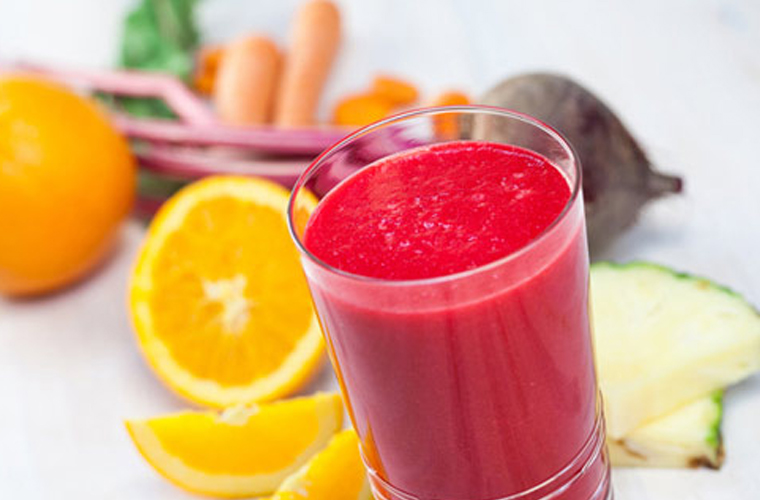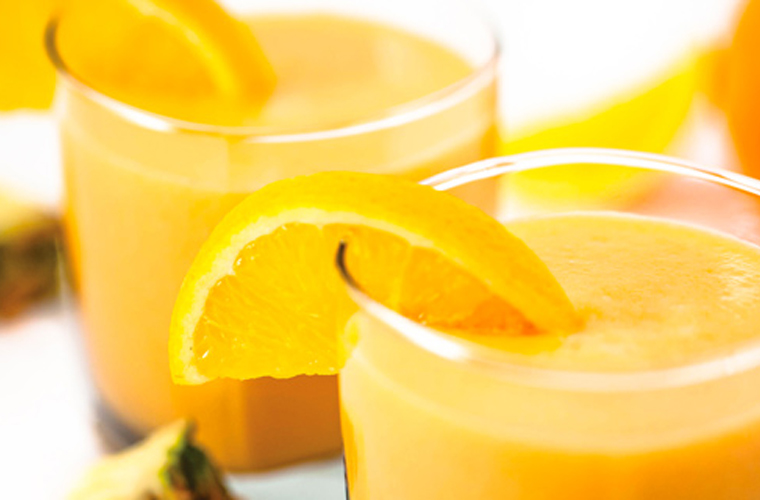Benefits of Whole Juicing

It’s no secret that eating fruits and vegetables has infinite benefits. Produce (whether fresh or frozen) is packed full of micronutrients (vitamins and minerals) and phytochemicals essential for optimum health. The UDSA recommends 5 servings of fruits and veggies per day and most Americans are not meeting these recommendations (1). If we are honest with ourselves, do we really eat 2-3 cups of veggies and 1-2 cups of fruits every single day? Fruits tend to be sweeter (due to natural sugars), have a great taste and don’t often require much food preparation to make them delicious. Vegetables are usually lower in calories, are often less sweet, and are a great source of essential nutrients.  Because fruits and veggies are so unique in nutrition (full of nutrients including vitamins, minerals and fiber without loads of calories and fat), no other food or supplement can replace produce in our diet. Some of the nutrients in fruits and veggies can be found in other foods, but not with the same nutrient profile. To benefit from all that produce has to offer, it is crucial to maintain the integrity of fruits and veggies. Using the Blendtec to achieve this is so easy. The Blendtec takes fresh or frozen produce such as bananas, beets, carrots, kale, and blueberries and liquefies them, using a little water or other liquid. Traditional juicers take the fruit/vegetable and mechanically separate the juice from the pulp and oftentimes the pulp is tossed in the garbage while the juice is consumed. It’s unfortunate to see the loss of such precious pulp, fiber and nutrition. Drinking real fruit and/or vegetable juice is great and contains some nutrients, we just believe in consuming the entire fruit and vegetable to get the maximum health benefits. The pulp cannot be underestimated as it retains so much of the natural goodness contained in fruits and veggies. We recommend Whole Juicing instead of just juicing! There is a texture difference between traditional juice and whole juice. Whole juice still has all the fiber, so like high-pulp orange juice the texture is detected on the tongue and the mouthfeel is a little different. If allowed to sit, the pulp will separate and rise to the top and become “frothy”. To combine again, simply stir with a spoon or use a shaker bottle to mix the pulp and liquid, just like shaking the high-pulp orange juice before pouring out of the container.
Because fruits and veggies are so unique in nutrition (full of nutrients including vitamins, minerals and fiber without loads of calories and fat), no other food or supplement can replace produce in our diet. Some of the nutrients in fruits and veggies can be found in other foods, but not with the same nutrient profile. To benefit from all that produce has to offer, it is crucial to maintain the integrity of fruits and veggies. Using the Blendtec to achieve this is so easy. The Blendtec takes fresh or frozen produce such as bananas, beets, carrots, kale, and blueberries and liquefies them, using a little water or other liquid. Traditional juicers take the fruit/vegetable and mechanically separate the juice from the pulp and oftentimes the pulp is tossed in the garbage while the juice is consumed. It’s unfortunate to see the loss of such precious pulp, fiber and nutrition. Drinking real fruit and/or vegetable juice is great and contains some nutrients, we just believe in consuming the entire fruit and vegetable to get the maximum health benefits. The pulp cannot be underestimated as it retains so much of the natural goodness contained in fruits and veggies. We recommend Whole Juicing instead of just juicing! There is a texture difference between traditional juice and whole juice. Whole juice still has all the fiber, so like high-pulp orange juice the texture is detected on the tongue and the mouthfeel is a little different. If allowed to sit, the pulp will separate and rise to the top and become “frothy”. To combine again, simply stir with a spoon or use a shaker bottle to mix the pulp and liquid, just like shaking the high-pulp orange juice before pouring out of the container.  The Blendtec whole juices all kinds of fruits and vegetables. You can be more creative and incorporate seeds and nuts into your juice as well. Check out our Blendtec recipes to get inspiration for your own recipes. You can also enjoy some of our own whole juice recipes: Carrot Juice, Citrus Sunrise Juice, Garden Green Giant Juice, Pineapple Juice, Pineapple Orange Juice, Tomato Vegetable Juice, and Total Juice. References
The Blendtec whole juices all kinds of fruits and vegetables. You can be more creative and incorporate seeds and nuts into your juice as well. Check out our Blendtec recipes to get inspiration for your own recipes. You can also enjoy some of our own whole juice recipes: Carrot Juice, Citrus Sunrise Juice, Garden Green Giant Juice, Pineapple Juice, Pineapple Orange Juice, Tomato Vegetable Juice, and Total Juice. References
 Because fruits and veggies are so unique in nutrition (full of nutrients including vitamins, minerals and fiber without loads of calories and fat), no other food or supplement can replace produce in our diet. Some of the nutrients in fruits and veggies can be found in other foods, but not with the same nutrient profile. To benefit from all that produce has to offer, it is crucial to maintain the integrity of fruits and veggies. Using the Blendtec to achieve this is so easy. The Blendtec takes fresh or frozen produce such as bananas, beets, carrots, kale, and blueberries and liquefies them, using a little water or other liquid. Traditional juicers take the fruit/vegetable and mechanically separate the juice from the pulp and oftentimes the pulp is tossed in the garbage while the juice is consumed. It’s unfortunate to see the loss of such precious pulp, fiber and nutrition. Drinking real fruit and/or vegetable juice is great and contains some nutrients, we just believe in consuming the entire fruit and vegetable to get the maximum health benefits. The pulp cannot be underestimated as it retains so much of the natural goodness contained in fruits and veggies. We recommend Whole Juicing instead of just juicing! There is a texture difference between traditional juice and whole juice. Whole juice still has all the fiber, so like high-pulp orange juice the texture is detected on the tongue and the mouthfeel is a little different. If allowed to sit, the pulp will separate and rise to the top and become “frothy”. To combine again, simply stir with a spoon or use a shaker bottle to mix the pulp and liquid, just like shaking the high-pulp orange juice before pouring out of the container.
Because fruits and veggies are so unique in nutrition (full of nutrients including vitamins, minerals and fiber without loads of calories and fat), no other food or supplement can replace produce in our diet. Some of the nutrients in fruits and veggies can be found in other foods, but not with the same nutrient profile. To benefit from all that produce has to offer, it is crucial to maintain the integrity of fruits and veggies. Using the Blendtec to achieve this is so easy. The Blendtec takes fresh or frozen produce such as bananas, beets, carrots, kale, and blueberries and liquefies them, using a little water or other liquid. Traditional juicers take the fruit/vegetable and mechanically separate the juice from the pulp and oftentimes the pulp is tossed in the garbage while the juice is consumed. It’s unfortunate to see the loss of such precious pulp, fiber and nutrition. Drinking real fruit and/or vegetable juice is great and contains some nutrients, we just believe in consuming the entire fruit and vegetable to get the maximum health benefits. The pulp cannot be underestimated as it retains so much of the natural goodness contained in fruits and veggies. We recommend Whole Juicing instead of just juicing! There is a texture difference between traditional juice and whole juice. Whole juice still has all the fiber, so like high-pulp orange juice the texture is detected on the tongue and the mouthfeel is a little different. If allowed to sit, the pulp will separate and rise to the top and become “frothy”. To combine again, simply stir with a spoon or use a shaker bottle to mix the pulp and liquid, just like shaking the high-pulp orange juice before pouring out of the container.  The Blendtec whole juices all kinds of fruits and vegetables. You can be more creative and incorporate seeds and nuts into your juice as well. Check out our Blendtec recipes to get inspiration for your own recipes. You can also enjoy some of our own whole juice recipes: Carrot Juice, Citrus Sunrise Juice, Garden Green Giant Juice, Pineapple Juice, Pineapple Orange Juice, Tomato Vegetable Juice, and Total Juice. References
The Blendtec whole juices all kinds of fruits and vegetables. You can be more creative and incorporate seeds and nuts into your juice as well. Check out our Blendtec recipes to get inspiration for your own recipes. You can also enjoy some of our own whole juice recipes: Carrot Juice, Citrus Sunrise Juice, Garden Green Giant Juice, Pineapple Juice, Pineapple Orange Juice, Tomato Vegetable Juice, and Total Juice. References
- Bowman S, Friday J, Clemens J, Moshfegh A. Vegetables, Fruit, and Whole Grains Consumption by U.S. Adults at Meals and Snacks: WWEIA, NHANES 2011-12. April 2015, The FASEB Journal,vol. 29 no. 1, Supplement 587.5
Leave a comment